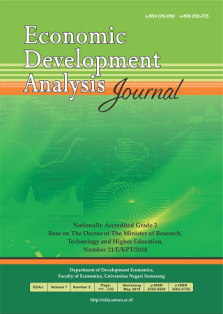The Role of Green Budgeting on Environmental Quality on Indonesia
Abstract
Law Number 32 of 2009 requires Regional Governments to allocate an adequate environmental protection and management budget. However, the allocation of green budgeting is less than 1% of the Regional Revenue and Expenditure Budget. This study aims to determine the effect of green budgeting, Human Development Index (HDI), Foreign Direct Investment (FDI), and population density on environmental quality in Indonesia from 2011-2020. The research method used is descriptive quantitative with panel data regression analysis techniques. Data were taken from 34 provinces in Indonesia from 2011 – 2020. The research variables are Environmental Quality, Green Budgeting, Human Development Index, Foreign Direct Investment, and Population Density. The data were obtained from the Central Agency of Statistics and the Ministry of Environment and Forestry Republic Indonesia using literature study data collection techniques. The data was processed using the Eviews 9.0 analysis tool, with the Fixed Effects Model as the best model. The finding shows that green budgeting has a positive but insignificant effect, Human Development Index (HDI) has a significant positive effect. In contrast, Foreign Direct Investment (FDI) and population density significantly negatively affect environmental quality in Indonesia.


